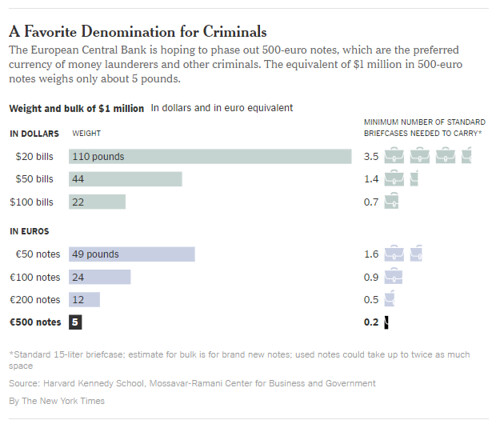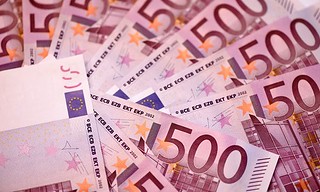
PREV ARTICLE
NEXT ARTICLE
FULL ISSUE
PREV FULL ISSUE
EUROPE TO DISCONTINUE 500-EURO BILL
Now that we've discussed the low end of the denomination spectrum, here's a story about the high end. Pablo Hoffman forwarded
this New York Times story about the discontinuance of the 500 Euro note. -Editor

A suitcase stuffed full of cash may soon be worth a lot less. In a move aimed at hampering cash transactions by terrorists, drug dealers and money launderers, the European Central Bank on Wednesday announced an end to the 500-euro bank note, worth roughly $575. When it comes to moving money nefariously, the €500 note has been especially handy. It is a large denomination in a widely circulated and easily convertible currency. In the United States, the largest denomination is $100, after the Federal Reserve discontinued the $500, $1,000, $5,000 and $10,000 bills in 1969. Switzerland has a 1,000-franc note, worth about $1,050, but its supply is limited. The €500 note is also more compact and convenient for evading the gaze of authorities. The equivalent of $1 million, in that high euro note, weighs about five pounds and fits in a small bag, according to a Harvard University study this year. After the European Central Bank phases out the €500 note by the end of 2018, the next highest denomination will be €200. That same $1 million would weigh roughly two and half times as much. And using $100 bills is just downright bulky. That would clock in at roughly 22 pounds and require an entire briefcase to carry. Getting rid of the €500 bill “will make life harder for criminals, raising their costs and increasing their detection risks,” Peter Sands, the lead author of the Harvard study and a former chief executive of the British bank Standard Chartered, wrote in an emailon Wednesday. The European Central Bank said it would not take the more radical step of declaring that €500 bills are no longer legal tender. Such a move would have meant the notes could no longer be legally used for transactions. People with €500 notes would have had to bring them back to a central bank to be exchanged for smaller denominations. Mr. Sands said the central bank could take steps to discourage use of the notes still in circulation, for example, by requiring banks to ask questions when customers present €500 bills for deposit. To critics, the steps taken on Wednesday were seen as an infringement on personal freedoms, as they make it harder for people to opt out of the traditional financial system. Those opposed to the move argue that criminals are not the only ones to use large bills. There was a surge in demand for €500 bills during the global market panic that came after the collapse of the investment bank Lehman Brothers in September 2008, according to a 2011 study by the European Central Bank. Some people no longer trusted the banking system and preferred to hold cash. To read the complete article, see:
Here's another article on the topic from The Guardian. -Editor
The ECB announced on Wednesday that the fuchsia-coloured bills, the highest denomination of the eurozone’s seven banknotes, would no longer be printed or distributed from 2018, on the grounds that they are too often used to finance crime. The move, approved by the bank’s governing council meeting in Frankfurt, comes after months of mounting pressure from France – which has been working to clamp down on terrorist financing in the wake of last year’s attacks in Paris – but equally stiff opposition from Germany. To read the complete article, see:
To read some earlier E-Sylum articles, see:
Wayne Homren, Editor The Numismatic Bibliomania Society is a non-profit organization promoting numismatic literature. See our web site at coinbooks.org. To submit items for publication in The E-Sylum, write to the Editor at this address: whomren@gmail.com To subscribe go to: https://my.binhost.com/lists/listinfo/esylum All Rights Reserved. NBS Home Page Contact the NBS webmaster 
|
